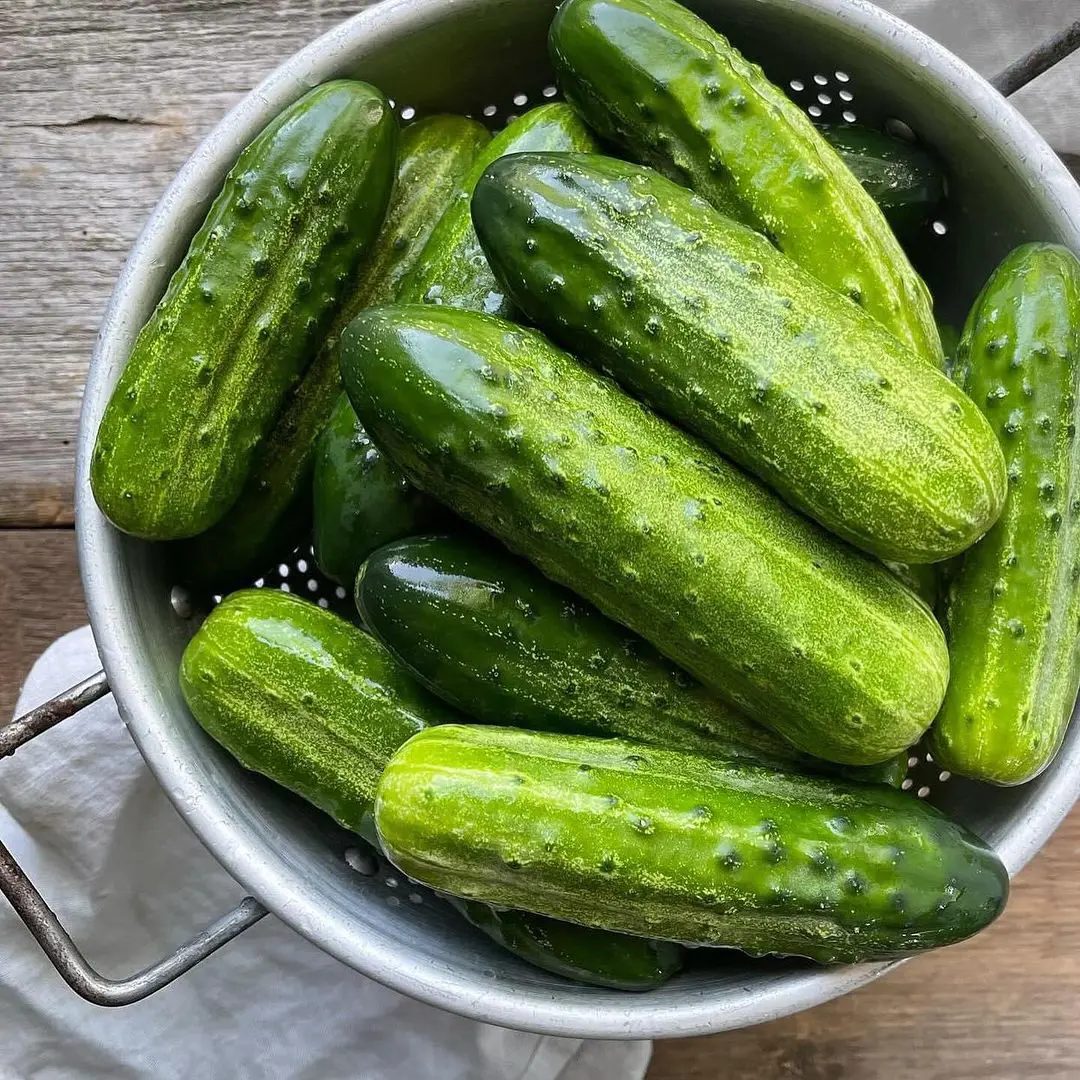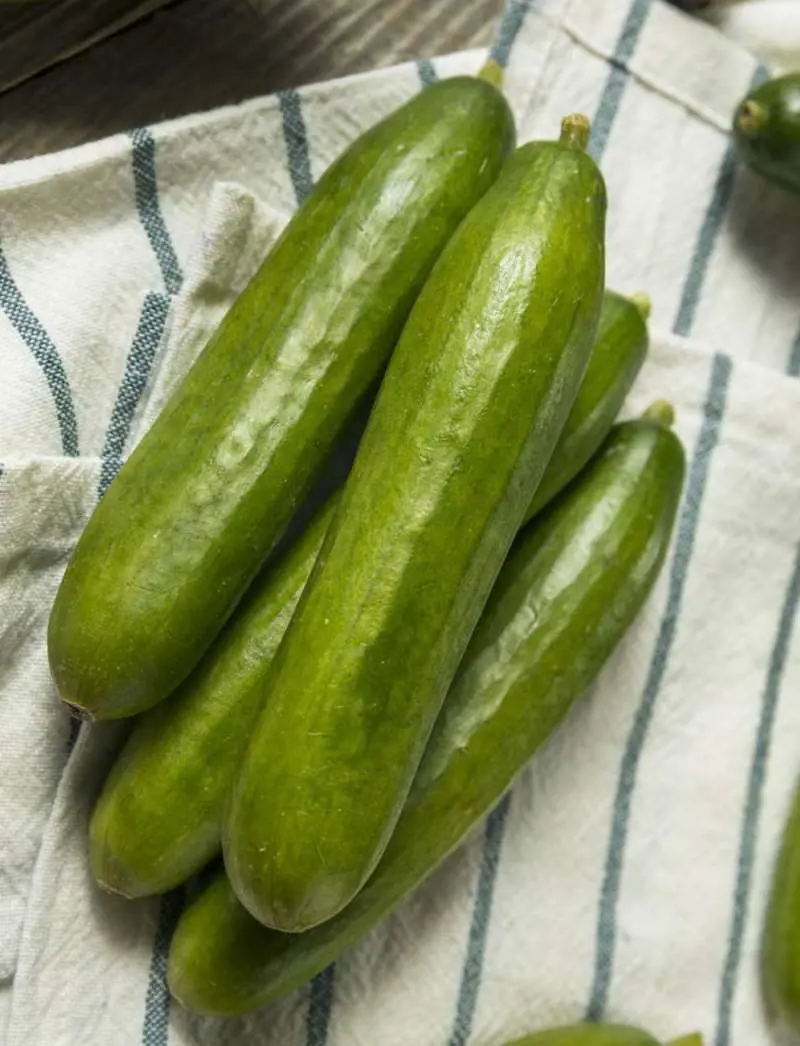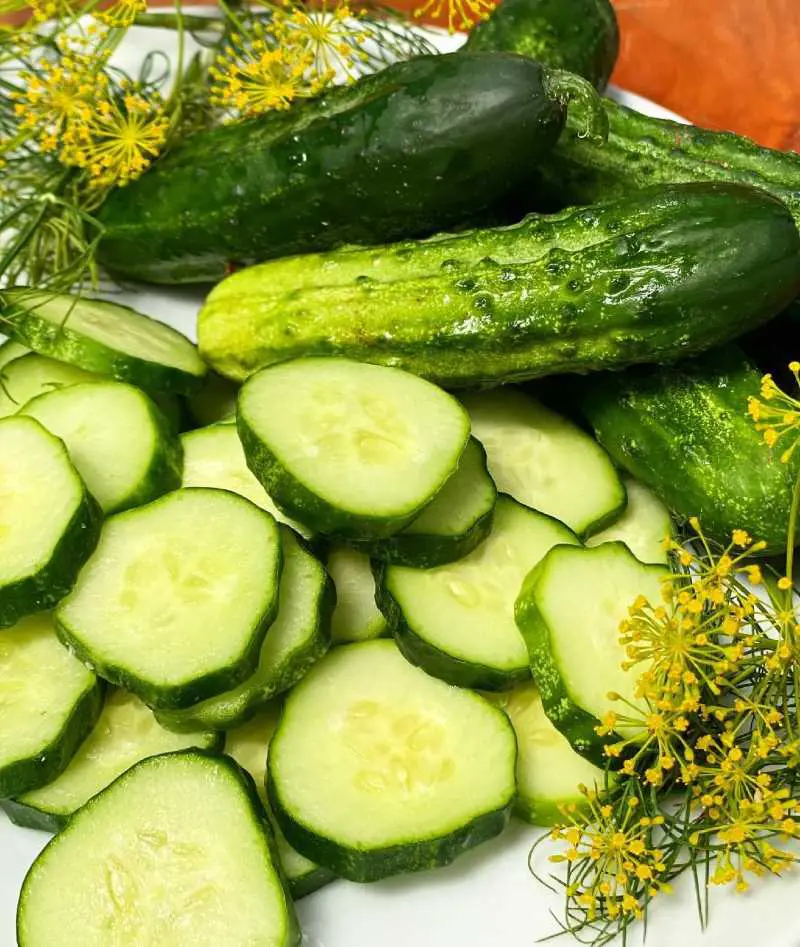Cucumbers' Nutrition And Health Benefits

This post may contain affiliate links. If you make a purchase through links on our site, we may earn a commission.
The cucumber is a widely cultivated creeping vine plant of the gourd family. While often mistaken for a vegetable, it's actually a fruit with a high water content.
Packed with vital nutrients, it aids in relieving dehydration and supplies an array of essential vitamins and minerals. Moreover, cucumbers are a low-calorie option, making them a top pick for supporting weight loss goals.
Cucumbers Are High In Nutrition
Cucumbers are a hydrating powerhouse being composed of approximately 95% water, 4% carbohydrates, and 1% protein while containing negligible fat.
They are rich in beneficial nutrients, plant compounds, and antioxidants that hold the potential to aid in the treatment and prevention of various health conditions.
In a mere 11-ounce (300-gram) serving of unpeeled, raw cucumber, you'll find the following nutritional highlights:
- Calories: 45
- Carbs: 11 grams
- Total fat: 0 grams
- Fiber: 2 grams
- Protein: 2 grams
- Potassium: 13% of the RDI (Recommended Dietary Intake)
- Vitamin C: 14% of the RDI
- Vitamin K: 62% of the RDI
- Magnesium: 10% of the RDI
- Manganese: 12% of the RDI

Water
Cucumbers boast an impressive water content, comprising around 95% of their composition, making them the food with the highest water content. They are also remarkably low in calories, with just 8 calories in a half-cup (52-gram) serving.
This high water content not only makes cucumbers exceptionally refreshing but also allows you to enjoy a large portion of them without introducing a substantial calorie intake to your diet.
This quality can be particularly beneficial for weight management purposes.
Vitamins and Minerals
Cucumbers are naturally rich in water, which gives them a relatively low nutrient concentration.
However, they do provide some valuable nutrients, including modest amounts of vitamin C, vitamin K, and vitamin B5, along with traces of essential minerals like calcium, magnesium, and phosphorus.
Moreover, cucumbers serve as an excellent source of phytonutrients, which are plant compounds known for their protective and disease-preventive properties.
Carbs
A half-cup of sliced cucumber provides around 2 grams of carbohydrates. It contains 0.9 grams of natural sugar and has a low glycemic index of 15, meaning it is unlikely to elevate blood sugar.
This low-carb diet not only has the potential to improve your blood pressure, cholesterol, and blood sugar levels but also helps reduce appetite, lower triglyceride levels, and promote weight loss.
Protein
Cucumbers are considered low-protein fruits, offering a mere 0.3 grams per serving.
If you're looking to boost your protein intake, especially if you're physically active, it's advisable to pair cucumbers with protein-rich foods such as nuts, seeds, and meat to meet your dietary needs effectively.
Fiber
Cucumbers are notably rich in soluble fiber, which plays a crucial role in promoting regular bowel movements and supporting a healthy metabolism. Additionally, soluble fiber can help lower cholesterol levels.
In fact, a mere 133-gram cup of chopped, unpeeled cucumber contains approximately 1 gram of dietary fiber, contributing to these beneficial effects.
Rich In Antioxidants

Antioxidants are compounds that block oxidation, a chemical reaction that generates highly reactive atoms with unpaired electrons, commonly referred to as free radicals.
The collection of these harmful free radicals can contribute to the development of various chronic illnesses. In fact, oxidative stress induced by free radicals has been linked to conditions such as cancer, as well as heart, lung, and autoimmune diseases.
Fruits and vegetables, including cucumber, are particularly abundant sources of valuable antioxidants, which have the potential to lower the risk of developing these conditions.
Health Benefits

As a result of an impressive nutritional profile and widespread consumption, cucumbers have been linked with several health benefits ranging from the control of blood sugar levels to the prevention of cancer.
The nutritional advantages of cucumbers make them an ideal choice for maintaining a healthy diet, as these low-calorie fruits boast numerous hydrating properties and essential nutrients.
Here are some of the significant health benefits associated with cucumbers:
1. Increases Hydration
Cucumbers are primarily composed of water and are also rich in essential electrolytes, making them an excellent choice to combat dehydration in hot weather or after physical activity.
Ensuring proper hydration is crucial for various aspects of well-being, including promoting healthy digestion, preventing constipation, reducing the risk of kidney stones, regulating body temperature, and much more.
2. Bone Health
Cucumbers are high in vitamin K, a crucial nutrient that helps with blood clotting and potentially supports bone health. When combined with vitamin D, vitamin K has the potential to enhance bone density and decrease fracture rates.
Moreover, vitamin K aids in the absorption of calcium and other essential nutrients vital for the development and maintenance of strong bones.
3. May Aid In Weight Loss
The high water and low-calorie content of cucumbers aid in reducing weight. A one-cup (104-gram) serving contains just 16 calories, allowing you to enjoy generous portions of cucumbers without adding excess calories to your meals.
Adding cucumbers to your dishes can bring a burst of freshness and flavor, enhancing the appeal of salads, sandwiches, and side dishes, while also offering a lower-calorie alternative.

4. Promotes Gut Health
The natural water content in cucumbers helps in digestion by assisting your body in breaking down food and absorbing essential nutrients.
Additionally, the fiber in cucumbers helps maintain regular bowel movements, preventing constipation and promoting digestive health. Pickling cucumbers can further enhance the advantages for your gut.
5. Helps Manage Blood Sugar
Several studies suggest that cucumbers could be beneficial in managing and preventing diabetes mellitus by potentially reducing blood sugar levels. This is attributed to their low carb, calorie, and sugar content.
Cucumbers also have a low glycemic index (GI), which means they have a minimal impact on blood sugar levels, as the GI measures how rapidly a food can affect your blood sugar.
Indeed, their low GI and overall nutritional profile make cucumbers a healthy and beneficial addition to your diet.
6. Reduces The Risk Of Cancer
Cucumbers are rich in Cucurbitacin B (CuB), a naturally occurring plant compound that has garnered attention for its potential impact on cancer cells. Recent research reviews have highlighted CuB's potential in combatting liver, breast, lung, and prostate cancer.
Moreover, Cucumber peels also contribute to cancer prevention by serving as a rich source of dietary fiber, which not only alleviates constipation but also provides protection against colon cancer.
7. Heart Health
High amounts of sodium lead to elevated blood pressure levels. Potassium helps reduce blood pressure by minimizing the effects of sodium. Cucumbers, high in potassium and low in sodium, are a great choice for maintaining healthy blood pressure.
The CuB in cucumbers protects your heart by fighting atherosclerosis, which is the accumulation of fat on artery walls. Fiber also helps reduce cholesterol, and studies have shown that it can decrease your risk of heart disease.
8. Benefits Our Eyes and Skin
Applying cucumber slices to the eyes for about 10 minutes can relax the eyes and reduce puffiness. Cucumber can be used either in its raw form or as an ingredient in cosmetic products like herbal moisturizers and eye lotions for this purpose.
Cucumbers are excellent beauty enhancers. Applying cucumber juice to the skin can make it soft and give it a radiant glow. Additionally, its anti-inflammatory properties can naturally lighten the skin and reduce tanning.
Types of Cucumbers

There are hundreds of varieties of cucumber that come in dozens of colors, including white, orange, and yellow. However, when categorizing, they can be primarily grouped into three main types: slicing, pickling, and seedless.
1. English cucumbers
English cucumbers, also known as greenhouse, burpless, seedless, or European cucumbers, are long and slender. They feature sweet, crisp flesh enclosed within a smooth, thin, dark green skin.
2. Persian cucumbers
Persian cucumbers, known for their easy digestibility, are prized for their thin size, edible skin, and minimal seed content, much like English cucumbers. These burpless cucumbers are more flavorful and easier to eat.
3. White cucumbers
White cucumbers, with their captivating ivory skins, come in various options, including the classic White Wonder, an heirloom cucumber introduced to New York in 1893, known for its refreshing and crunchy qualities.
These cucumbers are best enjoyed raw.
4. Lemon cucumbers
Lemon cucumbers, with their small tennis ball-sized, round, and yellow appearance, might share a name and color with the beloved acidic Mediterranean citrus fruit. Yet, their true charm lies in their mild, sweet flavor and cool, crispy texture.
5. Kirby cucumbers
Kirby cucumbers are small, mild, and super-crunchy. The most common variety of pickling cucumbers, they are usually six inches long or less and have firm flesh and bumpy skin.
Associated Risks of Cucumber

Cucumbers are generally safe for most people to consume, but there are certain considerations to keep in mind.
- Certain individuals may experience difficulties digesting specific types of cucumbers, which can sometimes lead to digestive issues such as flatulence and bloating.
- Some people have reported an allergic reaction to cucumber. For those with a known allergy, it is crucial to avoid all contact with cucumbers.
- People who are taking blood thinners should exercise caution when consuming cucumbers, as they contain vitamin K, which can make blood clotting further difficult.
- Cucumbers are rich in potassium, which may require restriction for individuals with CKD. Additionally, since cucumbers consist of over 90% water, those on dialysis need to be careful regarding excessive consumption.
Recent posts
Nutrition
Nutrition
Hard Boiled Eggs Nutrition, Benefits And How To Eat?
Packed with vitamins, minerals, and protein, hard-boiled eggs are a nutritious powerhouse that gives your body endurance and vitality. They are adaptable, simple to make, and pair well with various types of healthy diets. Hard-boiled eggs are rich in...
Nutrition
Duck Eggs Benefits, Nutrition, And How To Eat?
Believed to have better taste and texture than chicken eggs and significantly bigger, duck eggs are nutrient-packed. They supply a very high amount of protein, omega-3 fatty acids, vitamins and minerals which makes them perfect for people who wish to...
Nutrition
Are Egg Whites Good For You? Benefits, Nutrition, And How To Eat?
Egg whites are popular these days while egg yolks are considered a health havoc. This claim is not always true but if you are someone who is going through weight gain problems or other conditions like heart disease, it's important to focus on egg whi...
Nutrition
20 Heart Healthy Foods You Must Include In Your Diet
Your heart is your body's engine that functions nonstop to maintain your vitality. It's time to give back to your heart which does so much to you. Eating heart-healthy proper food is one of the simple and effective ways to boost your heart health. Ho...
Nutrition
20 Foods You Can Eat On A Low Residue Diet
A low-residue diet is designed to minimize the amount of undigested food that moves through the intestines, making it beneficial for individuals with certain digestive issues, such as inflammatory bowel disease or before certain medical procedures. T...
Nutrition
15 Moringa Benefits That Can Make You Healthier
Known as the "miracle tree", moringa is celebrated for its remarkable health advantages. This plant’s leaves, flowers, seeds, and roots have been often used in folk medicine as they bear numerous minerals and antioxidant properties. This plant ...







